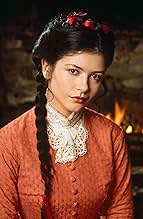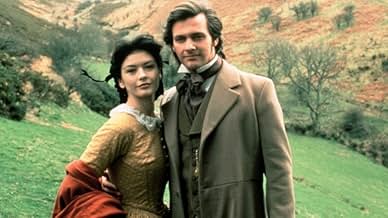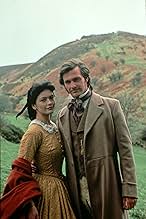AVALIAÇÃO DA IMDb
6,0/10
829
SUA AVALIAÇÃO
Adicionar um enredo no seu idiomaReddleman Diggory Venn drives slowly across the heath, carrying a hidden passenger in the back of his van. When darkness falls, the country folk light bonfires on the hills, emphasizing the ... Ler tudoReddleman Diggory Venn drives slowly across the heath, carrying a hidden passenger in the back of his van. When darkness falls, the country folk light bonfires on the hills, emphasizing the pagan spirit of the heath and its denizens.Reddleman Diggory Venn drives slowly across the heath, carrying a hidden passenger in the back of his van. When darkness falls, the country folk light bonfires on the hills, emphasizing the pagan spirit of the heath and its denizens.
- Direção
- Roteiristas
- Artistas
- Indicado para 1 Primetime Emmy
- 2 indicações no total
Catherine Zeta-Jones
- Eustacia Vye
- (as Catherine Zeta Jones)
Greg Saunders
- Charley
- (as Gregg Saunders)
- Direção
- Roteiristas
- Elenco e equipe completos
- Produção, bilheteria e muito mais no IMDbPro
Avaliações em destaque
When I was in high school, one book that was required reading in English literature was Thomas Hardy's The Return of the Native. I found the book enthralling and the main character of Eustacia Vye bewitching and unforgettable, a person who simply could not find happiness in life no matter how hard she connived to achieve it. I always wondered why a film had not been made of the book, then Hallmark Hall of Fame finally gave it the first-class treatment, with excellent production values, sumptuous costumes and photography, an intelligent script, fine musical score, and brilliant actors. Catherine Zeta Jones (at the time not the big star she is today) is a magnificent Eustacia, willfull, emotional, sad, depressed, flirtatious, deluded, manipulative, and tragic. She was the exact Eustacia I pictured in the novel. Hardy's theme of nature's indifference to humanity's suffering is indeed bleak, but can provide a stunning and moving experience. One leaves with admiration for Eustacia's tenacity in seeking that elusive thing we all seek, a world in which we feel we truly belong and can lead meaningful and fulfilled lives. Her feeling of being an outsider in Egdon Heath is a feeling which is universal. If you enjoyed the book, I predict you will be well pleased with this film. (Also, Joan Plowright stands at as Mrs. Yeobright.)
In 1994, Catherine Zeta-Jones sealed her fate to forever play the bad girl. She starred in two television adaptations of very famous novels, Catherine Cookson's The Cinder Path and Thomas Hardy's The Return of the Native. In the latter, she plays the bewitching village outcast whose power over men is so great the townspeople think she's a witch. She enjoys toying with their emotions, but soon learns the consequences of her actions.
With a large supporting cast of Clive Owen, Steven Mackintosh, Joan Plowright, Celia Imrie, Ray Stevenson, and Claire Skinner, The Return of the Native is a must-see for fans of historical romances. Keep in mind that it comes from a Thomas Hardy novel, so it'll be a little depressing. There's also some strange elements included in the story, like the alleged witchery and the constant red pigment to Steven Mackintosh's skin-which is explained better in the book.
It's difficult to hate Catherine because she's so beautiful, and at times during the sad story, you'll even feel sorry for her. She, Ray, Steven, and Joan give great performances, tugging at your heart and making you want more when the movie's over. While this one isn't my favorite sweeping historical drama-Thomas Hardy stories are just too sad for me-it's a very famous one to add to your list if you like that genre.
With a large supporting cast of Clive Owen, Steven Mackintosh, Joan Plowright, Celia Imrie, Ray Stevenson, and Claire Skinner, The Return of the Native is a must-see for fans of historical romances. Keep in mind that it comes from a Thomas Hardy novel, so it'll be a little depressing. There's also some strange elements included in the story, like the alleged witchery and the constant red pigment to Steven Mackintosh's skin-which is explained better in the book.
It's difficult to hate Catherine because she's so beautiful, and at times during the sad story, you'll even feel sorry for her. She, Ray, Steven, and Joan give great performances, tugging at your heart and making you want more when the movie's over. While this one isn't my favorite sweeping historical drama-Thomas Hardy stories are just too sad for me-it's a very famous one to add to your list if you like that genre.
I picked this up on whim from my local library. Being a fan of English settings and of period romance, I considered it a good candidate for some afternoon diversion. Unfortunately, it was one of those movies where you simultaneously want it to end, but feel impelled to watch it to finish (perhaps imagining that it will take a turn for the better, which this movie never does). So, yes, I was disappointed, but not as disappointed as I was when checking here and discovering that everyone who's reviewed this adaptation of a novel I admittedly have never read (and most likely never will, now) found it so wonderful!
I see lots of comments about Zeta-Jones, but fail to understand what's so noteworthy in her performance here. I found it flat and lacking in dimension (I guess those are the same things). Eustacia is selfish, fickle and flighty and because of that, primarily just distant and distracted. I appreciate that this is her nature, but instead of finding her intriguing or even mysterious, I found myself annoyed and disinterested. This lack of depth mad her, in my mind, clearly unworthy of either of her two love interests, even considering that one becomes an adulterer. I found nothing tragic in her character, no subtlety that would beg for understanding. In fact, she wasn't even very good at being the evil temptress/witch.
Worst of all, her character never really develops, serving instead simply to provide the antagonist to the plot. Sure, Catherine's a doll, but that alone isn't enough to sustain interest in her role here. She has developed into a marvelous actress since this movie was made(as more recent performances attest to), so I have to assume that her relative inexperience as an actress at this point, combined with poor production values in the making of the movie, cast her in this bad light.
Overall, the story tries so hard to moralize, but employs some pretty lame appeals for sympathy. In particular, Clym's loss of sight seemed silly; I didn't feel at all for this guy with all of his obsessive book-reading (and doesn't one of the characters even warn him that he'll "go blind from all your reading"). He can't even put the damn book down when he's in bed with his beautiful new bride. Furthermore, Ray Stevenson's acting adds nothing to the role, which I found only to be yet again another flat performance.
Now I admit Clive Owen's Damon had some fire to him and his easily stands out as the best performance, but it couldn't save the film. I won't go on and on, but I will remark that this BBC production is not on par with others they've taken on, such as the absolutely glorious 1995 BBC/A&E version of Pride and Prejudice, but then not having read Hardy, I have no way of knowing if he was as clever an artist as Jane Austen was. I have to admit there are horrible adaptations of her work out there, as well, so for now, I'll give Hardy the benefit of the doubt (how nice of me, you're thinking) and write this off to an uninspired telling of his tale.
I see lots of comments about Zeta-Jones, but fail to understand what's so noteworthy in her performance here. I found it flat and lacking in dimension (I guess those are the same things). Eustacia is selfish, fickle and flighty and because of that, primarily just distant and distracted. I appreciate that this is her nature, but instead of finding her intriguing or even mysterious, I found myself annoyed and disinterested. This lack of depth mad her, in my mind, clearly unworthy of either of her two love interests, even considering that one becomes an adulterer. I found nothing tragic in her character, no subtlety that would beg for understanding. In fact, she wasn't even very good at being the evil temptress/witch.
Worst of all, her character never really develops, serving instead simply to provide the antagonist to the plot. Sure, Catherine's a doll, but that alone isn't enough to sustain interest in her role here. She has developed into a marvelous actress since this movie was made(as more recent performances attest to), so I have to assume that her relative inexperience as an actress at this point, combined with poor production values in the making of the movie, cast her in this bad light.
Overall, the story tries so hard to moralize, but employs some pretty lame appeals for sympathy. In particular, Clym's loss of sight seemed silly; I didn't feel at all for this guy with all of his obsessive book-reading (and doesn't one of the characters even warn him that he'll "go blind from all your reading"). He can't even put the damn book down when he's in bed with his beautiful new bride. Furthermore, Ray Stevenson's acting adds nothing to the role, which I found only to be yet again another flat performance.
Now I admit Clive Owen's Damon had some fire to him and his easily stands out as the best performance, but it couldn't save the film. I won't go on and on, but I will remark that this BBC production is not on par with others they've taken on, such as the absolutely glorious 1995 BBC/A&E version of Pride and Prejudice, but then not having read Hardy, I have no way of knowing if he was as clever an artist as Jane Austen was. I have to admit there are horrible adaptations of her work out there, as well, so for now, I'll give Hardy the benefit of the doubt (how nice of me, you're thinking) and write this off to an uninspired telling of his tale.
10ADORA
This movie is very well done! The acting is exceptional! It is a wonderful adaptation of the novel. I was enthralled from the beginning. The gorgeous landscapes, & beautiful period costumes help to make this movie a must see! I highly recommend it!
It seems that all western literature have the same theme. All tragedies are due to the stupidity of men and all comedies are due to the cleverness of women.
As this movie is based on a Thomas Hardy story, it is naturally a tragedy. True to form, the stupidity of men, was the primary cause of the tragedy. Of course, a woman must be blamed especially if the woman is not content to be an obedient and docile wife to a selfish and blind husband.
Clym, as a spoiled only son, only ever thought of himself. What he wants was all he cared. It never mattered what his mother wanted or what his wife wanted. He must have his way. When his wish was challenged, he blamed his mother. When his dream was shattered, he blamed his wife. Yet, he was considered the good son, the good man, the good husband, and the hero. That's the real tragedy.
Eustasia, as a girl with a dream beyond the small backwards village in a harsh landscape, only dreamed of a better life in the shinny world. But the ignorant villagers shunned her as a witch. No matter what she does, she was the evil one. Her stupid selfish husband never understood because he only thought of himself and what he wants. In the end, she could only escape from her jail was to die. That's the real tragedy.
That was the bleak rural life of Thomas Hardy's England. I gave the movie 7 stars because it was well staged, well acted, and focused.
As this movie is based on a Thomas Hardy story, it is naturally a tragedy. True to form, the stupidity of men, was the primary cause of the tragedy. Of course, a woman must be blamed especially if the woman is not content to be an obedient and docile wife to a selfish and blind husband.
Clym, as a spoiled only son, only ever thought of himself. What he wants was all he cared. It never mattered what his mother wanted or what his wife wanted. He must have his way. When his wish was challenged, he blamed his mother. When his dream was shattered, he blamed his wife. Yet, he was considered the good son, the good man, the good husband, and the hero. That's the real tragedy.
Eustasia, as a girl with a dream beyond the small backwards village in a harsh landscape, only dreamed of a better life in the shinny world. But the ignorant villagers shunned her as a witch. No matter what she does, she was the evil one. Her stupid selfish husband never understood because he only thought of himself and what he wants. In the end, she could only escape from her jail was to die. That's the real tragedy.
That was the bleak rural life of Thomas Hardy's England. I gave the movie 7 stars because it was well staged, well acted, and focused.
Você sabia?
- CuriosidadesDiggory Venn (Steven Mackintosh) works as a reddleman. He digs red ochre (clay), also known as ferric oxide, to be used as a red dye to mark sheep.
- Erros de gravaçãoThe story is set in 1842. When Susan Nunsuch is given a sixpence, a close-up of the coin shows it to bear the head of Elizabeth II (1952-2022), not that of Queen Victoria (1837-1901).
- ConexõesEdited into Hallmark Hall of Fame (1951)
Principais escolhas
Faça login para avaliar e ver a lista de recomendações personalizadas
Detalhes
- Data de lançamento
- Países de origem
- Idioma
- Também conhecido como
- Hallmark Hall of Fame: The Return of the Native (#44.1)
- Locações de filme
- Empresas de produção
- Consulte mais créditos da empresa na IMDbPro
Contribua para esta página
Sugerir uma alteração ou adicionar conteúdo ausente

Principal brecha
By what name was O Retorno de um Nativo (1994) officially released in Canada in English?
Responda
































